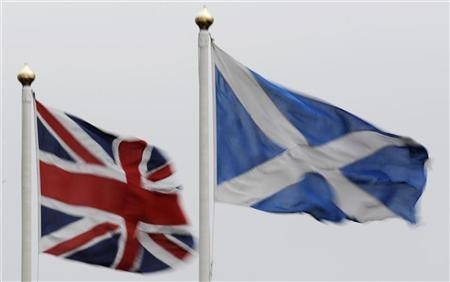Scotland Will Have to Reapply to EU after Independence

The UK government has reinforced its warning that Scotland would have to reapply for its European Union membership if it becomes independent.
In the first of the UK government's Scotland analysis series, which looks at Scotland's place in the UK and how it contributes to and benefits from the Union, a report by the HM Treasury speculated that if the country voted for its independence in a referendum in autumn 2014, it would be forced to reapply for European Union membership.
"Within the EU, there is no precedent for what happens when a metropolitan part of a current Member State becomes independent, so it is necessary to speculate. On the face of it, Scotland would be required to accede to the EU as a new state, which would require negotiations on the terms of its membership, including on the subjects of the UK's current opt-outs," say authors of the report Professor James Crawford and Professor Alan Boyle.
"The EU treaties make no provision for succession to membership. Certain provisions of the EU treaties would require amendment. If Scotland were somehow to become an EU member in its own right automatically, it is not clear how adjustments to the relative positions of Member States could be willed into being without negotiations. Nor would it be clear on what terms it would be a member," they add.
Speculation as to whether Scotland would be booted out of the EU, in the event of independence, has been rife since the Scottish National Party (SNP) won a majority of seats in the Scottish Parliament in May 2011 and subsequently demanded that it wanted to hold a referendum on the independence of Scotland from the UK.
On 15 October 2012, the UK and Scottish governments signed an agreement 'to work together to ensure that a referendum on Scottish independence can take place' that states, among other things, that it should 'have a clear legal base', 'be conducted so as to command the confidence of parliaments, governments and people' and 'deliver a fair test and a decisive expression of the views of people in Scotland and a result that everyone will respect'.
Three UK governmental departments, The Foreign and Commonwealth Office, the Cabinet Office and the Office of the Advocate General for Scotland, jointly instructed Crawford and Boyle to advise in connection with the proposed referendum.
Initially, Alex Salmond told voters that his legal officers supported the notion that Scotland would have automatic EU membership should it become independent.
However, he was soon accused of misleading Scottish voters about EU legal advice by a number of EU politicians.
European Commission President Jose Manuel Barroso cast doubts over Scotland's EU membership in December last year, after saying that EU law states that newly formed independent states would have to reapply.
"What I said, and it is our doctrine and it is clear since 2004 in legal terms, if one part of a country - I am not referring now to any specific one - wants to become an independent state, of course as an independent state it has to apply to the European membership according to the rules - that is obvious," said Barroso in a BBC interview.
Meanwhile, the authors of the report determined that while it would be likely that Scotland would have to reapply for EU membership in the event of Scottish independence, the report reiterated that the remaining parts of the UK (rUK) would still be part of the the EU, although it may incur some adjustments to the existing agreement.
"Since the rUK would be the same state as the UK, its EU membership would continue. Indeed, the EU treaties impliedly preclude 'automatic' withdrawal by a state. There might have to be an adjustment to the UK's terms of membership to reflect its reduction in territory and population, but this could be done without the UK ceasing to be an EU Member State," says the report.
"Some have argued that the rights conferred on individuals by EU citizenship might influence the European Court of Justice (ECJ) to somehow resist this outcome. But this is a matter for speculation and does not have a clear precedent in EU law. It would also require the issue to somehow come before the ECJ, which may be unlikely. In any event, Scotland's position within the EU is likely to be shaped more by any agreements between the parties than by pre-existing principles of EU law," it adds.
© Copyright IBTimes 2025. All rights reserved.






















